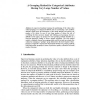Free Online Productivity Tools
i2Speak
i2Symbol
i2OCR
iTex2Img
iWeb2Print
iWeb2Shot
i2Type
iPdf2Split
iPdf2Merge
i2Bopomofo
i2Arabic
i2Style
i2Image
i2PDF
iLatex2Rtf
Sci2ools
MLDM
2005
Springer
2005
Springer
A Grouping Method for Categorical Attributes Having Very Large Number of Values
In supervised machine learning, the partitioning of the values (also called grouping) of a categorical attribute aims at constructing a new synthetic attribute which keeps the information of the initial attribute and reduces the number of its values. In case of very large number of values, the risk of overfitting the data increases sharply and building good groupings becomes difficult. In this paper, we propose two new grouping methods founded on a Bayesian approach, leading to Bayes optimal groupings. The first method exploits a standard schema for grouping models and the second one extends this schema by managing a "garbage" group dedicated to the least frequent values. Extensive comparative experiments demonstrate that the new grouping methods build high quality groupings in terms of predictive quality, robustness and small number of groups.
Bayes Optimal Groupings | Categorical Attribute | Initial Attribute | Machine Learning | MLDM 2005 |
| Added | 28 Jun 2010 |
| Updated | 28 Jun 2010 |
| Type | Conference |
| Year | 2005 |
| Where | MLDM |
| Authors | Marc Boullé |
Comments (0)

